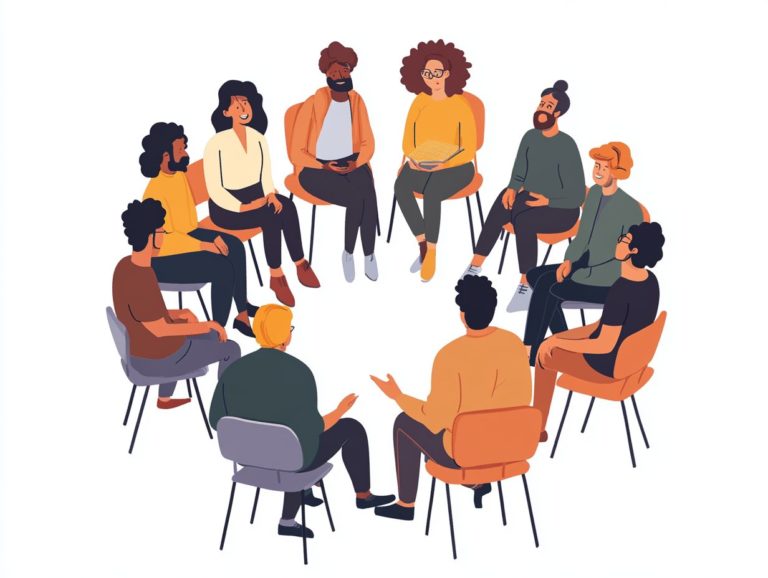How to Build Confidence Against Limiting Beliefs
Limiting beliefs can quietly sabotage your confidence and self-esteem, often without your awareness. It s time to break free from what s holding you back! Discover how limiting beliefs can be transformed into stepping stones toward success. These self-imposed barriers shape your perceptions and stifle personal growth, leaving you feeling stuck in a rut.
This article delves into what limiting beliefs are, how you can identify them in your life, and the impact they have on your confidence. You ll uncover practical strategies to challenge and overcome these negative thoughts, empowering you to cultivate a more confident and fulfilling life. Join us as we explore practical steps to break free from these barriers!
Embark on this journey to reclaim your true potential!
Contents
- Key Takeaways:
- Understanding Limiting Beliefs
- The Impact of Limiting Beliefs on Confidence
- Identifying Your Own Limiting Beliefs
- Strategies for Overcoming Limiting Beliefs
- Boosting Confidence and Self-Esteem
- Frequently Asked Questions
- What are limiting beliefs and how do they affect our confidence?
- How can I identify my limiting beliefs?
- What can I do to build confidence against limiting beliefs?
- How can positive affirmations help in building confidence against limiting beliefs?
- What role does self-care play in overcoming limiting beliefs and building confidence?
- How can seeking support from others help in building confidence against limiting beliefs?
Key Takeaways:

- Don’t let limiting beliefs hold you back from reaching your full potential. Identify and challenge them to build confidence.
- Surround yourself with a supportive network to help overcome limiting beliefs.
- Boost your confidence and self-esteem by actively working on challenging and replacing negative thoughts.
Understanding Limiting Beliefs
Understanding your limiting beliefs is essential if you’re pursuing personal growth. These self-imposed constraints can create barriers that prevent you from reaching your full potential. Often shaped by past experiences, cultural conditioning, or negative self-talk, these beliefs can chip away at your self-confidence and obstruct your path to overcoming obstacles.
By recognizing and confronting these beliefs through therapy techniques that change negative thoughts and mindfulness practices, you can embark on a transformative journey toward self-discovery and emotional liberation.
Influential figures like Andrea Hunt and Pooja Agnihotri have delved deeply into these concepts, offering valuable insights on how to free yourself from limiting beliefs and nurture a growth mindset.
Defining and Identifying Limiting Beliefs
Defining and identifying limiting beliefs is crucial for anyone looking to change their mindset and enhance their life. These beliefs often arise from negative thoughts that obstruct personal growth and self-confidence.
Such beliefs can manifest as an inner dialogue that fuels fear, self-doubt, or feelings of inadequacy. It is essential for you to become aware of your thought patterns. For example, you might think you’re not “smart enough” to tackle a challenging career, subtly influencing your decisions and limiting your opportunities.
Cognitive behavioral coaching can help transform these beliefs by encouraging you to challenge and reframe your thoughts. Once you recognize that these limitations are often exaggerated or unfounded, you can replace negative narratives with realistic affirmations. Additionally, learning how to use meditation for limiting beliefs can further empower you, ultimately fostering growth and enhancing your self-efficacy.
The Impact of Limiting Beliefs on Confidence
Limiting beliefs have a profound effect on your self-confidence. They often cause you to question your abilities and erect barriers that hinder your pursuit of personal growth and the ability to overcome challenges. To effectively address these issues, learning how to overcome limiting beliefs in sports can be particularly beneficial, especially in scenarios like Imposter Syndrome, where the fear of inadequacy can stifle your true potential.
If you don t recognize and confront these beliefs, you may find yourself ensnared in a cycle of self-doubt and missed opportunities, a situation made worse by insufficient support systems.
Techniques like the Emotional Freedom Technique (EFT), a method that helps reduce emotional distress, can help you dismantle these limiting beliefs, giving you the power to transform your mindset and reclaim your self-esteem and confidence.
How They Hold You Back

Self-limiting beliefs can be a significant barrier, perpetuating negative thoughts that erode your self-confidence and hinder your journey toward realizing your full potential. Learning how to mentor someone through limiting beliefs can help you break these cycles both personally and professionally.
Take, for instance, a career scenario. You might find yourself convinced that you’re not qualified enough to apply for that leadership position. This mindset restricts your job opportunities and stifles your growth.
In relationships, these beliefs can lead to a fear of vulnerability, causing you to sabotage meaningful connections to avoid the sting of rejection.
Even in pursuit of personal goals, the daunting feeling of lacking the necessary skills or resources can hold you back. Fortunately, methods to improve your emotional well-being, like tapping, provide a practical solution.
By confronting these deeply ingrained beliefs, you can reframe those negative thoughts, opening the door to give the power to positive change in every aspect of your life.
Identifying Your Own Limiting Beliefs
Identifying your limiting beliefs starts with sincere self-reflection. Recognizing these patterns is the crucial first step toward cultivating a growth mindset and aligning with your personal values.
Common examples may include fears of failure, feelings of unworthiness, or the belief that success is out of reach. These can be effectively addressed through techniques like coaching that helps change negative thinking.
By examining these beliefs, you can learn to discern limiting beliefs from those that hold you back. This transformation fosters meaningful personal growth.
Common Examples and How to Recognize Them
Common examples of self-limiting beliefs might include thoughts like “I’m not good enough” or “I will fail,” which can lead to feelings related to Imposter Syndrome, ultimately hindering your personal growth and self-exploration.
These beliefs can subtly seep into your daily life, influencing your decision-making and interactions. For instance, you might shy away from advancement opportunities due to a fear of inadequacy or avoid social connections out of concern for being judged.
Recognizing these beliefs is your first step toward transformation, and it often calls for some deep reflection. Keeping a journal to document your thoughts and feelings can unveil patterns tied to self-doubt.
Seeking feedback from trusted friends can provide valuable insights that challenge these negative narratives. Engaging in self-questioning and exploring the roots of these beliefs perhaps tracing them back to childhood experiences or societal pressures can be enlightening.
This process helps you develop a more empowered mindset, allowing you to break free from those constraints.
Strategies for Overcoming Limiting Beliefs
Implementing strategies to overcome limiting beliefs is vital for your personal growth. Techniques such as positive affirmations, visualization techniques that help you imagine success, and mindfulness practices can empower you to conquer obstacles and reprogram your mindset.
Embracing these methods lets you break free from constraints and cultivate a more empowered perspective on your journey.
Challenging and Replacing Negative Thoughts

Challenging and replacing negative thoughts with positive affirmations is a vital step in overcoming self-limiting beliefs, empowering you to build self-confidence through effective cognitive behavioral coaching techniques. For more insights, check out this guide on how to cultivate resilience against limiting beliefs.
By actively engaging in this transformative process, you can learn to reframe your internal dialogue, turning harmful thought patterns into constructive encouragement. For example, instead of thinking, “I always fail at this,” you could embrace a more uplifting affirmation like, “I am learning and growing with every experience.”
Cognitive behavioral coaching provides a robust framework for this change, offering practical strategies such as identifying cognitive distortions and crafting personalized affirmations. You are encouraged to incorporate these steps into your daily routine, allowing you to witness a gradual improvement in your mindset and overall well-being.
Building a Support System
Building a robust support system is essential for overcoming limiting beliefs. A strong community encourages you to align with your personal values while fostering a profound sense of belonging.
This sense of community not only provides encouragement but also serves as a valuable platform for sharing experiences and insights. Support groups, whether in person or online, can significantly boost your confidence by offering a safe space to express your fears and unlock your potential. This mutual engagement plays a crucial role in dismantling the barriers created by negative thoughts.
Incorporating tools like Emotional Freedom Technique (EFT) a method that helps release emotional blockages can further enhance your journey. By tapping into the collective wisdom within your community, you can challenge and reframe your limiting beliefs more effectively, paving the way for personal growth and give the power to you.
Boosting Confidence and Self-Esteem
Boosting your confidence and self-esteem is crucial for your personal growth and resilience. Embracing practical techniques like positive self-talk, setting realistic goals, and nurturing your motivation can profoundly enhance your outlook on life.
Practical Tips and Techniques
Practical tips and techniques for boosting self-confidence include employing positive self-talk, setting realistic goals, and engaging in ongoing self-discovery to keep your motivation alive.
You can greatly benefit from celebrating small victories. This practice reinforces your sense of accomplishment and gives you the power to reach even greater heights. Regularly practicing gratitude shifts your focus away from self-doubt and nurtures a more positive mindset.
Taking effective action, like stepping outside your comfort zone and embracing new experiences, not only bolsters your confidence but also encourages personal growth. Surrounding yourself with supportive friends and mentors who uplift you creates an environment that fosters self-improvement.
Ultimately, the journey toward heightened self-esteem demands consistent self-reflection and a proactive approach to personal development.
Frequently Asked Questions

What are limiting beliefs and how do they affect our confidence?
Limiting beliefs are negative thoughts or beliefs about ourselves, our abilities, or our circumstances that hold us back from reaching our full potential. They can greatly impact our confidence, as they often make us doubt our capabilities and worth.
How can I identify my limiting beliefs?
A good way to identify limiting beliefs is by paying attention to your thoughts and inner dialogue. Notice when you have negative thoughts or doubts about yourself and try to pinpoint the underlying belief behind them.
What can I do to build confidence against limiting beliefs?
One effective way to build confidence against limiting beliefs is by challenging them with evidence that proves them wrong. Consider exploring how to challenge your limiting beliefs and look for examples of times when you have successfully overcome similar challenges or achieved something you didn’t think was possible.
How can positive affirmations help in building confidence against limiting beliefs?
Positive affirmations are powerful statements that can help counteract negative thoughts and beliefs. By regularly repeating affirmations such as “I am capable” or “I am enough,” you can gradually rewire your thinking and build confidence against limiting beliefs.
What role does self-care play in overcoming limiting beliefs and building confidence?
Self-care boosts your self-esteem. When you care for yourself mentally, physically, and emotionally, you feel more capable and deserving of success.
How can seeking support from others help in building confidence against limiting beliefs?
Talking to trusted friends, family members, or a therapist can provide a valuable outside perspective and help challenge your limiting beliefs. They can offer encouragement, support, and advice, including how to guide others in overcoming limiting beliefs, to help you overcome your doubts and build confidence.
Embrace the journey of building your confidence today!






